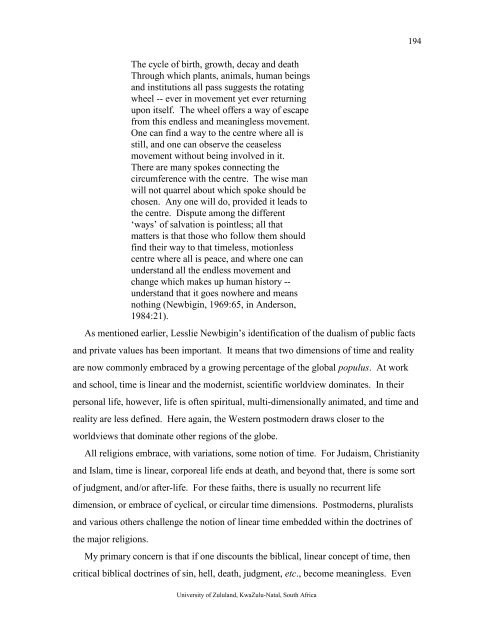Haase_UZ_x007E_DTh (2).pdf - South African Theological Seminary
Haase_UZ_x007E_DTh (2).pdf - South African Theological Seminary
Haase_UZ_x007E_DTh (2).pdf - South African Theological Seminary
You also want an ePaper? Increase the reach of your titles
YUMPU automatically turns print PDFs into web optimized ePapers that Google loves.
The cycle of birth, growth, decay and death<br />
Through which plants, animals, human beings<br />
and institutions all pass suggests the rotating<br />
wheel -- ever in movement yet ever returning<br />
upon itself. The wheel offers a way of escape<br />
from this endless and meaningless movement.<br />
One can find a way to the centre where all is<br />
still, and one can observe the ceaseless<br />
movement without being involved in it.<br />
There are many spokes connecting the<br />
circumference with the centre. The wise man<br />
will not quarrel about which spoke should be<br />
chosen. Any one will do, provided it leads to<br />
the centre. Dispute among the different<br />
‘ways’ of salvation is pointless; all that<br />
matters is that those who follow them should<br />
find their way to that timeless, motionless<br />
centre where all is peace, and where one can<br />
understand all the endless movement and<br />
change which makes up human history --<br />
understand that it goes nowhere and means<br />
nothing (Newbigin, 1969:65, in Anderson,<br />
1984:21).<br />
As mentioned earlier, Lesslie Newbigin’s identification of the dualism of public facts<br />
and private values has been important. It means that two dimensions of time and reality<br />
are now commonly embraced by a growing percentage of the global populus. At work<br />
and school, time is linear and the modernist, scientific worldview dominates. In their<br />
personal life, however, life is often spiritual, multi-dimensionally animated, and time and<br />
reality are less defined. Here again, the Western postmodern draws closer to the<br />
worldviews that dominate other regions of the globe.<br />
All religions embrace, with variations, some notion of time. For Judaism, Christianity<br />
and Islam, time is linear, corporeal life ends at death, and beyond that, there is some sort<br />
of judgment, and/or after-life. For these faiths, there is usually no recurrent life<br />
dimension, or embrace of cyclical, or circular time dimensions. Postmoderns, pluralists<br />
and various others challenge the notion of linear time embedded within the doctrines of<br />
the major religions.<br />
My primary concern is that if one discounts the biblical, linear concept of time, then<br />
critical biblical doctrines of sin, hell, death, judgment, etc., become meaningless. Even<br />
194<br />
University of Zululand, KwaZulu-Natal, <strong>South</strong> Africa

















